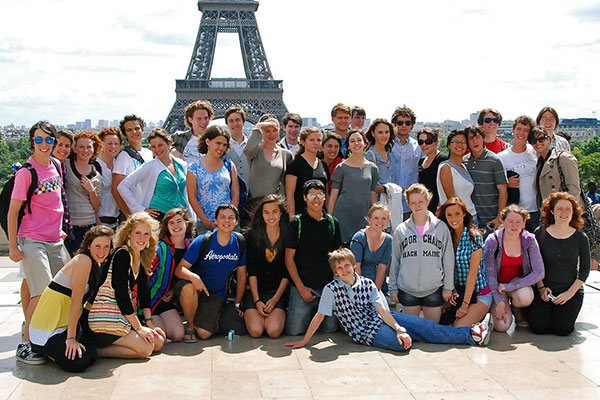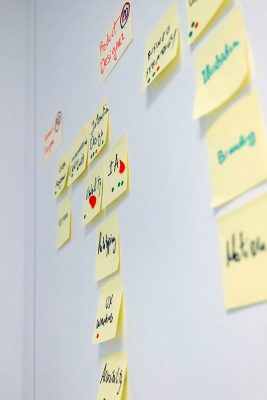Photo credit: Austin Distel
Disclosure: As an Amazon Associate, I earn from qualifying purchases.
I could have titled this post: “Are you Doing Great Things but Feeling Miserable?” or “Are you Wandering without a Clear Direction or a Sense of Accomplishment?”.
If those questions make you feel uncomfortable, if they resonate with you, this post is for you.
Not because I am going to give you all the tricks and tips to “get back on track” but because I have been there and want to share my journey about finding true career fulfillment.
Yep, I am a very analytical person. In all my years as an executive in a large pharmaceutical company and as an entrepreneur (Strateege Creative, a small ‘communications and web’ agency), people often praised for my strong analytical skills.
So when it came to finding the sense of fulfillment that I had lost in recent years, it was natural that I would approach the quest in a very analytical manner.
In this article, I will explain what “flow” is and will share three exercises to help you find true career fulfillment:
- Exercise 1: When have you experienced “flow” in your life?
- Exercise 2: What is your personal mission?
- Exercise 3 (the “yellow sticky notes” exercise): Which life and career path I am on?
I will start by sharing my own life journey, as an example of the way you can look at your life, your skills, abilities, desires, and experience, to better understand who you truly are.
So Here is My Journey
I just turned 60 (but still very young at heart!), and I have already had an amazing life. Born and raised in Brittany, France, I got my MBA in the US and moved to Montreal. There I held executive positions in marketing (12 years) and government affairs (3 years), in a multi-national company (see my Linkedin profile for some details). I then followed my creative side and worked in communications agencies for four years, to finally open my small agency, 17 years ago, which still exists today.
Looks like a pretty straight path, no? On the surface, yes, it does. But let’s dig a bit deeper.
Over the past 20 years, I:
- Took university classes in graphic design, web design, photography,
 I organized and served as a guide for a 45-people and 12-day tour across France,
I organized and served as a guide for a 45-people and 12-day tour across France,- Designed and decorated a new 50,000 square feet office building,
- Renovated and decorated a 400-year-old house in Brittany,
- Launched and operated a specialty food business (including manufacturing products myself!) (read the lessons learned)
- Managed a vacation rental (my property) in France, with success I might say (ranking #1000 out of 20,000 properties in Brittany,)
- Owned several blogs – on China, Vermont, cartography & explorers website, history of French America, and boreal cuisine.
A fascinating life, indeed, and I don’t regret any of it. Not to mention that I accomplished this while living ten years in the US, seven months in China, and back to France for a few months.
I could justify each of these steps – to myself at least – and life had also thrown some extra challenges my way, which prevented me from having a “standard” career path. In 2002 I met my husband, who owned a 50-person manufacturing business in gorgeous but middle-of-nowhere Vermont, which forced me to move there (not the best place for a large agency or pharmaceutical jobs!). Over the past 15 years, I also had to give a lot of time and attention to my now-adult son, who had some personal health issues.
So, when my specialty food business failed (I learned a lot, but food is a tough industry), I lost my sense of direction. At the time, my marriage was also hitting rock bottom, which ended up being both a curse and a blessing.
My marriage collapsed, I had to move out and close my US agency. I decided, with my son, who was a chef, to move to France, and open a restaurant near the house, which brought revenues as a vacation rental. At the restaurant, I would be in charge of the “front-of-the-house” in blunt words: serving customers.
That venture did not come to fruition (another blessing), due to my son’s health, so I spent some time in France (2019), personally taking care of my vacation rental, including cleaning duties and gardening. And I worked at the outdoors local market in the summer (selling chicken). Don’t get me wrong, that was fun! But was it fulfilling and using the best of my abilities? Humm, nope.
I finally decided to share my life between Brittany and Montreal: I would spend my winters in Montreal and my summers in France. I would rebuild my agency. But, instead of dedicating 100% of my time to it, I decided to take a safer road and took a full-time job as a music copyright consultant (customer service on the phone). The late shift (11:30 am to 8:00 pm) allowed me to do some agency work in the morning. It paid the essential bills, but I was not performing to the best of my abilities, nor was I building knowledge and expertise in an area of interest or investing in my future.
Was I lacking direction? In her book “The Search for Fulfillment”, the author Susan Krauss Whitbourne says that such meandering and lack of direction comes from not having a strong identity in younger years. I believe it can be better explained by difficulties to bounce back from failure. In one of her speeches (Amazon Prime Video: Michelle Obama: Hope Becomes Change), Michelle Obama said: “In life, it is essential to know how to get back up, because life is a lot about falling.” Well, in my formative years, I was never taught about “bouncing back from failure.” So, I guess I am really bad at it! Instead of bouncing back, it seemed that the challenges I faced progressively eroded my self-confidence, even though I had been a very successful executive with some outstanding achievements.
How Do You Find Fulfillment?
So, where do you go from there? How do you recover? How do you get back on track?
The good news is that I genuinely believe that it is possible, wherever you are on your life, and I want to share this journey of self-discovery, step-by-step, with you: the resources, the tools, the insights, the traps to avoid.
Today, I feel “aligned.” I have finally found my sense of fulfillment, and you can do too!
Are you ready for a new start?
-
Commit to a Major Introspection
You must STOP and reflect.
If you want this exercise of self-discovery to bring you the sense of fulfillment that you are longing for, you MUST be ready to commit time to it. It won’t happen in one day. It won’t happen in one week. There are a few books to read and some self-discovery exercises to do.
If you try to hurry it too much, you may miss something important, just like I had.
I have done a lot of introspection in my life. Remember, I am the “analytical one”. But until this recent introspection, I had missed the difference between being a creative person and being an artist. I had missed that I was indeed a creative person, but I was not an artist. I’ll show you how I discovered it and why it was a crucial discovery.
Take your time. Don’t rush. The project will have a few iterations. Remember: you are investing in your future. You are discovering how to be aligned with your true self, how to be fulfilled and successful.
-
Understand When You Experience Flow in Your Work
You must TRULY understand who you are and what brings you joy.
“Start listening to your heart just a little bit, because if you cannot feel it now, you won’t feel it then.” (watch “Start Feeling it Right Now“)
This French book on “flow” was my first epiphany: Marlies Terstegge “Le flow – Vivez les bienfaits de l’expérience optimal” (translation: The Flow – Experience the Benefits of the Optimal Experience).
(In English, you can read the national bestseller “Flow: The Psychology of Optimal Experience” from the psychologist Mihaly Csikszentmihalyi who recognized and named the psychological concept of flow.)
Yes, I had read “What is the color of your parachute?” years ago. I had done all the exercises. I had realized then how much analysis and research was part of my fiber, how much I loved that type of work, and how good I was at it. Over the years, I had often recommended this book to job seekers.
That was in my early 20s. Now some 30 years later, reflecting on the concept of flow in my life brought additional and precious insights.
So what is flow?
According to psychologist Mihály Csíkszentmihályi, flow is a state of positive consciousness that you experience when your whole being is involved in an activity and when you experience “deep enjoyment, creativity, and total involvement.” “The ego falls away. Time flies. Every action, movement, and thought follows inevitably from the previous one, like playing jazz. Your whole being is involved, and you’re using your skills to the utmost.” (read: “Flow” Can Help You Achieve Goals)
Why is flow so crucial in our lives and our work?
Flow can help you achieve your goals. Flow can bring you true happiness and significantly improve the quality of your life. The more you’ll have moments of flow in your work and in your career, the more fulfilled you will feel and the more aligned with your core identity you will be.
How do I bring more “flow” and fulfillment into my career?
There are many interesting insights in Marlies Terstegge’s book. Let me share here two exercises that I found particularly useful in this self-discovery process.
Exercise 1: When did you experience “flow” in your life?
Pen and paper. Reflect on your life. Look back at it, five years at a time, from the time you were a child to today, and write down all the activities during which you experienced “flow.” Think of times when you were utterly involved and losing yourself, so much so that time flew, that you were feeling “in the zone” and experiencing real happiness.
Do you start seeing some patterns throughout your life?
Let me share which key insights it brought me. Throughout my entire life, there was a pure joy to explore, learn, and discover. As a child, I had already decided that I would read all the books about the great explorers, from Erik the Red, Vasco de Gama, to Christopher Columbus, Champlain, Jacques Cartier, and many more. As a university student, I decided to live and work in different countries: there was so much to explore in the world beyond my home country. My first boyfriend was an explorer who discovered the deepest canyon in the world (located in Peru). National Geography published stories about some of his adventures. As an adult, I became fascinated with cartography and old maps and created a blog called “Maps & Explorers.” I love the great outdoors, camping and traveling, Scandinavia, etc. I was thrilled to visit Tromso in 2018, 200 miles north of the Arctic Circle, in January!
So, yes, I am an analytical mind. But this exercise gave me better insights about what I needed to bring more into my life. My love for analytics was just a piece of something bigger: a real passion for learning, exploration, and discovery.
Exercise 2: What is your personal mission?
This exercise is page 143 of the book. By then, the reader had time to reflect on his/her life. Let me share it with you.
What the author suggests is that it is crucial to have a clear direction and purpose in life, a personal mission, to feel fulfilled.
To discover your personal mission, here are ten questions you might find helpful:
- As a child, was there a mission you wanted to accomplish? And later in life?
- What message do you want to communicate to the world?
- What do you want people to say about you in the future?
- If you were old and you were walking with a (small) child who asked you: “What are you most proud of in your life?”, What would you say to him?
- What has changed in the world because of you?
- What do you wish you had accomplished before you died?
- What do you do to get noticed?
- Do you have a recurring dream that could be a mission?
- What kind of person would you like to be at the end of your life?
- If you have three minutes to express yourself on television, what would be the content of your message?
OK, so now that you have defined what can bring you true happiness, what is next?
-
Understand Your Career Path
I had my second epiphany while reading the book “The Search for Fulfillment”. Psychologist Susan Krauss Whitbourne has followed 350 people over 40 years and questioned them about their level of happiness and satisfaction, and their sense of purpose in life.
She defined five different life paths that people belong to and suggests ways to change and get on one of the more positive pathways to reach a higher level of fulfillment.
Can you see yourself in one of those pathways?
- The Meandering Way: You go from one thing to another, in your personal life or career, without a clear sense of your core identity, your lack priorities, and feel lost, unable to define clear life goals;
- The Downward Slope: Your life started very well until one or two poor decisions send it into a downward spiral.
- The Straight and Narrow Way: Your life is highly predictable. You shy away from risk and don’t like to shake up your routine.
- The Triumphant Trail: You have experienced much success, as your inner strength and positive approach to life has allowed you to overcome significant challenges.
- The Authentic Road: You live your life with honesty and courage; you regularly assess if you feel fulfilled, make the necessary corrections, and take reasonable risks to get back on track when needed.
Exercise 3: Which life and career path I am on? The “yellow sticky notes” exercise
It might not be easy to answer this question. So here is an exercise that I developed. A “yellow sticky notes” exercise already works wonders when developing website architecture or a digital content plan, and I found it extremely revealing in this context of understanding my life path.

All you need is an empty wall and some yellow sticky notes!
- Reflect on your life and particularly on your career and write each job and milestone in your life on a different note,
- Write down each achievement and project you are proud of, one per note,
- Write down what you believe are your core skills and your core elements of identity, one per note,
- Write everything that has given you “flow” in your life, one per note,
- You may also want to think about the nature of the projects that you list (manual, intellectual, analytical, creative, servicing others, outdoors, etc. and left brain vs. right brain (see test.)
- Think hard about your true self: for instance, you believe that you are or want to be a visual artist, but, when you have some free time, you never take a pencil to draw or a brush to paint, or your camera. Instead, you write. Listen to what it says about you.
Now, that’s when the magic comes! It’s time to organize those notes:
- In one column, place the notes that relate to times, events, projects, of jobs when you felt “aligned” with your authentic, core identity, when you felt “flow,” and when you felt fulfilled,
- In one column, places the notes that speak about your core skills and abilities, things you are “uniquely qualified for” (read more on this in an upcoming article),
- In one column, place the notes that are “meandering moments,” events, times, decisions when you were not aligned with your true self, when you were not performing to the best of your abilities.
What do you see? Do you see patterns? Are you getting a clear image of the person you need to be to feel a sense of happiness, alignment, and fulfillment?
I truly hope you do, and would love to hear your feedback. I certainly did.
You’re ready to take a new direction in your life! Or to confirm that your current path is the right one.
Now could be the beginning of a new journey. But you still need to make a living.
To do so, you are going to need to define:
- what makes you unique,
- what you are uniquely qualified to do,
- what skill is exciting and valuable enough for you to master,
- how do you fill the knowledge gaps to ensure success?
And if you are launching a new business, what problem does your business solve?
References:
- Left-brain/ Right-brain Test
- Chase Reeves, “Start Feeling it Right Now” (video)
Susan Krauss Whitbourne, “The Search for Fulfillment”
- Michelle Obama: Hope Becomes Change (documentary)
- Marlies Terstegge, “Le flow – Vivez les bienfaits de l’expérience optimal”
- Table of contents, introduction and chapter 1 of “Le flow – Vivez les bienfaits de l’expérience optimal”
- Mihaly Csikszentmihalyi, “Flow: The Psychology of Optimal Experience”
- ‘Flow’ Can Help You Achieve Goals – Understanding the Psychology of Flow
Want to pin this article?





I just want to mention that I came across your article and the post-it note project has literally sparked much-needed insight after just scrolling through jobs and thinking it will work for me. In reality it’s the “sound of the job” that I apply to. In reality I need to make it more about my post its than the prestige of the posting!
Kathryn,
Thanks so much for taking the time to write this comment. I am truly thrilled that the “post-it notes” exercise helped you.
Don’t hesitate to share it with others!